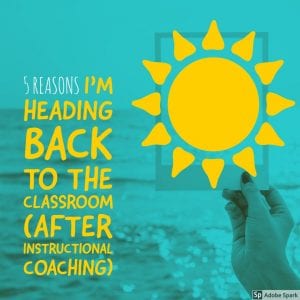5 Reasons I’m Heading Back to the Classroom (After Instructional Coaching)
This year I have the opportunity to transition back to the math classroom after two years of instructional coaching, and I’m taking it! While the decision was not easy, I felt a longing to return to the classroom since the day I left. I wondered if the feelings stemmed from a lack of experience and transitioning from being a veteran teacher to a novice coach. I had shared with my team

and administration that I wanted to return after the first year, but after listening attentively to me, they encouraged me to stay saying they felt I was well-suited for the role and perhaps with more experience and confidence, I might feel differently. However, my administration said they’d support my decision to return, if that’s what I wanted.I decided to spend another year serving my school as a coach. There were MANY things I enjoyed about instructional coaching, and I plan to share them in another blog post. But, let me share the key reasons I’m returning to the classroom.
- Kids Without a doubt, the number ONE reason I want to return to the classroom is my desire to work with kids. When I walk down the hallway, I well up with the empathy I feel for students whose eyes reveal their insecurities. I want to engage in their conversations; speak truth and encouragement into their lives. But, I’m always one step removed. Even when working in classrooms, I was the lady who came into their class for a day, and at most, a few days. It’s hard to build drive by relationships. After being out of the classroom for two years, the number of students with whom I had relationships had significantly dwindled and the thought of getting to a point where there were none was devastating to me.
- Party Planning While I’m no Angela Martin (Office reference), I love planning the party and watching the magic of learning happen. In coaching, you help to plan someone else’s party for someone else’s students. I miss designing creative ways to engage MY students and watching the joy of MY students as they learn. It’s entirely selfish, I know. Perhaps a person who is more selfless would be more comfortable riding in the sidecar, but it was a tough transition for me.
- Focus I LOVE to learn, and coaching allowed me to open up my learning to include all content areas. I have an increased passion for literacy strategies, the NGSS practices, best practices in co-teaching and other content areas as well. But, I miss being able to have one focused passion. I LOVE MATH! A colleague once shared with me how she remembered when I was in the classroom, I had made students love math, too. Yes! That’s what I want–for them to love it with me; to build their confidence in a content area that opens countless lucrative opportunities for them.
- A Full Toolbox While I am nowhere close to being a perfect teacher, I’ve spent the last two years building my toolbox of strategies. You know what’s no fun? Having a lot of tools without being able to use them. In coaching, I’d share the strategies I’d learn and watch other people use them. That always brought me joy. But, I’d like to give them a whirl myself. Again…selfish, I know…
- Beginnings and Endings Yes. In coaching we have a beginning and end to each year and there are timely PD opportunities we like to offer teachers. But, there is nothing like a brand new class list, planning for community building, and getting excited for a first day. Likewise, there is no greater relief for a teacher than closing the books on the year, knowing you’ve poured yourself out as best you could for students. I love a clean slate. I missed it in coaching.
All this being said, I hope my school knows that I have loved serving them as an instructional coach the past two years and am so grateful to have had the opportunity. I appreciate my administration’s encouragement and the confidence they’ve had in me. I’ve grown so much as an educator and I hope to share my experience as a coach in my next blog post.